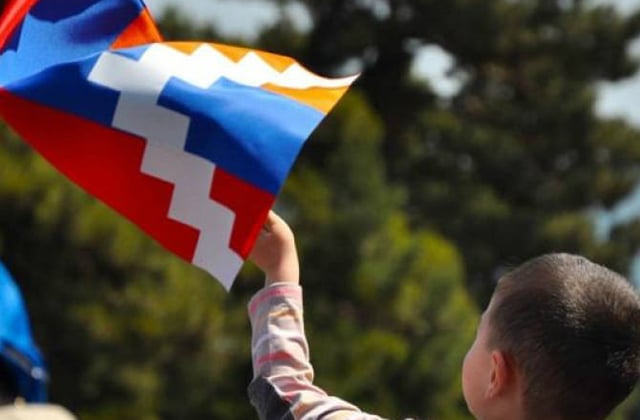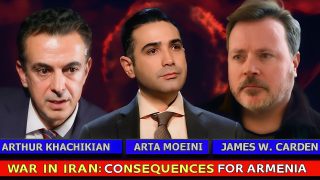Prominent genocide scholars have submitted an open letter to the UN Secretary-General, the UN High Commissioner for Human Rights, the Special Adviser of the UN Secretary-General on the Prevention of Genocide, and Member States of the UN Security Council

The scholars and experts on genocide issued the letter to UN SG and SC on the humanitarian crisis in Artsakh (Nagorno Karabakh) expressing their overwhelming sense of urgency and concern about the potential for a genocide targeting the ethnic Armenian population of Artsakh (Nagorno-Karabakh) and strongly urged member states and UN bodies to promptly and resolutely step forward.
H.E. António Guterres
UN Secretary-General,
Mr. Volker Türk
UN High Commissioner for Human Rights,
Ms. Alice Wairimu Nderitu
Special Adviser of the UN Secretary-General on the Prevention of Genocide,
UN Security Council Member States
9 August 2023
We, the undersigned scholars and experts on genocide, are writing to you with an overwhelming sense of urgency and concern about the potential for genocide in the Republic of Artsakh (also known as the Nagorno Karabakh Republic). As scholars deeply engaged in the study of genocide, we bear witness to the horrors of history, rigorously analyze past and present atrocities, working to prevent new genocides from occurring. Presently, we find ourselves profoundly concerned by the emergence of unmistakable warning signs of genocide in Artsakh. The most significant risk factor is the unlawful blockade of the Lachin Corridor, which serves as the vital link connecting Artsakh to Armenia.
Since December 2022, the Lachin Corridor, the sole lifeline connecting the Artsakh population to the outside world, has been unlawfully blockaded by Azerbaijani authorities. This distressing situation reached a critical juncture on June 15, 2023, when Azerbaijan sealed off this vital road, subjecting the Republic of Artsakh and its 120,000 residents to a dire state of siege. For the past two months, Artsakh has been forcibly deprived of its ability to access essential supplies such as food, medicine, and other critical goods. Even humanitarian relief efforts conducted by Russian peacekeepers and the International Committee of the Red Cross (ICRC) have been obstructed, exacerbating an already grave humanitarian crisis.
The escalating humanitarian crisis has prompted the ICRC, the sole international organization with a presence on the ground, to issue a grave alert. In a public statement released on July 25, the ICRC unequivocally documented that“The civilian population is now facing a lack of life-saving medication and essentials like hygiene products and baby formula. Fruits, vegetables, and bread are increasingly scarce and costly, while some other food items such as dairy products, sunflower oil, cereal, fish, and chicken are not available.”
Furthermore, the Global Centre for the Responsibility to Protect has issued an alarming atrocity alert for Nagorno Karabakh, highlighting the persistent risk of enduring mass atrocity crimes.
Considering the aforementioned circumstances and drawing upon additional pertinent information provided by various impartial organizations, human rights organisations, and other relevant stakeholders, we, as experts in the field of genocide studies, hold the view that compelling indicators exist that in the absence of prompt and resolute action, a genocide targeting the ethnic Armenian population of Artsakh is a looming possibility. The prevention of genocide and safeguarding vulnerable populations stand as fundamental obligations of the global community, as underscored by the United Nations Charter and the Genocide Convention of 1948, along with subsequent pledges undertaken by international actors. Guided by these principles, we strongly urge member states and UN bodies to promptly and resolutely step forward, exercising their responsibility to forestall any additional loss of innocent lives and preclude the occurrence of large-scale atrocities.
Specifically, we call upon the United Nations to activate its early warning mechanism, as stipulated within its mandates, to expeditiously address the tangible and imminent threat of genocide in Artsakh. We urge a concerted international effort to bring this grave situation to the attention of the UN Security Council. The Security Council should take decisive action to avert the progression of genocide by urgently removing the blockade on the Lachin Corridor, thereby reinstating unimpeded movement of persons, vehicles, and cargo along this life-supporting corridor in both directions. Security Council action should also support of the Provisional Measures order of the International Court of Justice (ICJ) of 22 February 2023 (reaffirmed 6 July 2023), which ordered Azerbaijan to ‘take all measures at its disposal to ensure unimpeded movement of persons, vehicles and cargo along the Lachin Corridor in both directions’. A Provisional Measures order is binding, and Azerbaijan remains in breach of its international law obligations by not complying with the ICJ’s order. Furthermore, we urge that the UN establish and send a fact-finding mission to Artsakh for a thorough analysis of data, on-site reporting, and engagement with local communities and organizations to identify and eliminate the consequences of the ongoing crime.
The prevention of genocide requires a collective effort, a unified resolve, and unwavering commitment from the international community. We urge the United Nations and its bodies to prioritize the prevention of genocide in Artsakh and take decisive action to protect the lives and dignity of thousands of innocent people.
Time is of the essence. We urge you to act swiftly and decisively, guided by the principles of the United Nations and the mandate to protect humanity from the scourge of genocide.
Respectfully signed,
Albayati, Ali. Iraqi Neuropsychologist, founder of Turkmen rescue foundation (Iraq), founder of Defenders for human rights (Netherlands)
Anderson, Kjell. Director, Master of Human Rights Program, University of Manitoba. Past Second Vice President of the International Association of Genocide Scholars
Arakelian, Sonia. Director of International Relations Museo Memoria y Tolerancia, Mexico
Attallah, Maral N. Distinguished Lecturer in Department of Critical Race, Gender & Sexuality Studies at Cal Poly Humboldt
Balakian, Peter. Donald M. and Constance H. Rebar Professor in Humanities, Professor of English, Colgate University
Bennett, Caroline. Lecturer in Anthropology and Human Rights, University of Sussex, UK, former Advisory Board member, International Association of Genocide Scholars and Director of the All-Party Parliamentary Group for the Prevention of Genocide and Crimes Against Humanity in the UK parliament
Bjørnlund, Matthias. Independent scholar
Boulgourdjian, Elena. Professor at National University of Tres de Febrero (Argentina)
Charny, Israel. Director of the Institute on the Holocaust and Genocide in Jerusalem, Past President of the International Association of Genocide Scholars (2005-2007)
Chatterjee, Kasturi. Assistant Professor, FLAME University, India
Darbinyan, Asya. Executive Director, Center for Holocaust, Human Rights, and Genocide Education at Brookdale Community College
Dayan, Jacobo. Genocide Professor, Universidad Ibero Americana, Mexico
Dwork, Debórah. Director, Center for the Study of the Holocaust, Genocide, and Crimes Against Humanity, Ralph Bunche Institute for International Studies, City University of New York Graduate Center
Earl, Hilary. Professor, European History and Genocide Studies, Nipissing University, Ontario, Canada
Fiumara, Franco. PhD, Judge, Professor, Universidad de Buenos Aires Law School, Argentina
Georgelin, Hervé. Assistant Professor, Department of Turkish Studies and Modern Asian Studies, National and Capodistrian University of Athens
Gershenson, Daniel. Human Rights Advocate, Mexico
Hayrapetyan, Diana. Ph.D. Candidate, Strassler Center for Holocaust and Genocide Studies, Clark University
Hein, Patrick. Ph.D., Lecturer Meiji University Japan
Hinton, Alex. Distinguished Professor, Rutgers University, Past President of the International Association of Genocide Scholars (2011-2013)
Hofmann, Tessa. Prof. h.c., Dr. Phil., independent scholar of Genocide and Armenian studies, author; formerly Freie Universität Berlin
Joeden-Forgey, Elisa von. Chair of Department of Holocaust and Genocide Studies, Keene State College, Past First Vice President of the International Association of Genocide Scholars (2015-17)
Kránitz, Péter Pál. Ph.D., independent scholar
Manukyan, Suren. Head of the UNESCO Chair on Education and Prevention of Genocide and other Atrocity Crimes, Yerevan State University
Marczak, Nikki. Atrocity Prevention Coordinator, Asia Pacific Centre for the Responsibility to Protect, University of Queensland
Marsoobian, Armen T. Professor of Philosophy, Southern Connecticut State University, Past First Vice President of the International Association of Genocide Scholars (2019-23)
Marutyan, Harutyun. Director, Armenian Genocide Museum-Institute
Massimino, Irene Victoria. Adjunct Professor, Indiana University Robert H. McKinney School of Law; former Secretary-Treasurer (2015-2017) and current member of the Advisory Board (2023-2025) of the International Association of Genocide Scholars
Mayersen, Deborah. Senior Lecturer in International and Political Studies, University of New South Wales Canberra at the Australian Defence Force Academy, Australia
Meichanetsidis, Vasileios. Greek Genocide scholar
Minassian, María Luciana. Assistant Professor, Universidad de Buenos Aires Law School
Muller, Adam. Professor, Director of Peace and Conflict Studies, University of Manitoba, Past First Vice President of the International Association of Genocide Scholars (2017-2019)
Neilsen, Rhiannon. Cyber Security Postdoctoral Fellow, Center for International Security and Cooperation (CISAC), Stanford University
Nzitatira, Hollie Nyseth. Associate Professor of Sociology at The Ohio State University, United States
O’Brien, Darren. Chair, Australian Institute for Holocaust and Genocide Studies, Honorary Senior Research Fellow, School of Historical and Philosophical Inquiry, University of Queensland, Australia
O’Brien, Melanie. Associate Professor of International Law, University of Western Australia; and President of the International Association of Genocide Scholars
Paulose, Regina M. International Criminal Law Attorney (US)
Peroomian, Rubina. Independent scholar, researcher, author, formerly UCLA
Semerdjian, Elyse. Robert Aram and Marianne Kaloosdian and Stephen and Marian Mugar Chair of Armenian Genocide Studies at the Strassler Center for Holocaust and Genocide Studies at Clark
Savelsberg, Joachim J. Professor of Sociology and Law; Arsham and Charlotte Ohanessian Chair, University of Minnesota
Tadevosyan, Margarita. Ph.D. Executive Director, Center for Peacemaking Practice, Jimmy and Rosalynn Carter School for Peace and Conflict Resolution, George Mason University
Theriault, Henry C. Associate Vice President for Academic Affairs at Worcester State University, Past President of the International Association of Genocide Scholars (2017-2021)
Walrath, Dana. Ph.D., MFA Global Atlantic Fellow for Equity in Brain Health: Global Brain Health Institute, Trinity College Dublin; University of California San Francisco
Whigham, Kerry. Co-Director, Institute for Genocide and Mass Atrocity Prevention, Binghamton University
Whitehorn, Alan. Professor Emeritus, Royal Military College of Canada
Woolford, Andrew. Professor, Head of Department of Sociology and Criminology, University of Manitoba, Past President of the International Association of Genocide Scholars (2015-2017)
Wright, Stephanie. Program Associate, Auschwitz Institute for the Prevention of Genocide and Mass Atrocities
Yacoubian, Hrag. Assistant Professor, Faculty of Nursing, Memorial University of Newfoundland

























